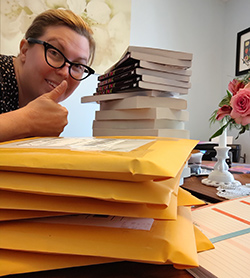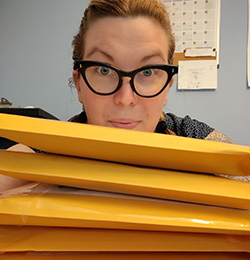One of Jennifer Ward’s favorite quotes about reading comes from American academic and aphorist Mason Cooley: “Reading gives us someplace to go when we have to stay where we are.”
For Ward, who teaches English at Grandville High School, the quote has really hit home while she and her students adjust to the challenges of distance learning. They wrapped up their school year this week after Michigan schools were shut down in March to curb the spread of the coronavirus.

“So much of what students are doing right now is connecting online, through screens,” Ward said. “This has allowed us to continue and connect and learn together, but it can also be fatiguing.”
To relieve screen fatigue, Ward has been purchasing and mailing — out of her own pocket — print books to her students. In one week, Ward mailed 24 books and planned to send 25 more the following week.
“We are all spending so much time in front of screens,” she said. “A book is a break from that constant connection. A physical book is an escape that you hold in your hands.”
For students who may not be able to connect online to read whenever they would like, she said, these books have been a way to stay engaged while stuck at home.
Adapting to Change

Ward uses First Book to buy books in bulk at a discount. It’s an organization she has used in the past to purchase materials for her classroom library.
Since the stay-at-home-order, Ward has picked out about 65 copies of seven titles. She said the most popular picks among students have been the fantasy series by Marissa Meyer, “The Lunar Chronicles”; and Elizabeth Acevedo’s 2018 novel, “The Poet X.”
After each order, she posts a notice on her Google Classroom site to ask which one they are interested in, then sends a copy in the mail.
She said spending her own money “is so worth it to get books into the hands of my students, especially now.”

Reading, Then Writing
Ward’s ninth and tenth grade English students also completed a reading and writing reflection every week “about their worries, their frustrations, as well as about their moments of joy,” she said.
Topics have included spending time outside, what they are reading, frustration over not being able to get away from siblings and their fears over parents who are laid off or have lost work, Ward said.
Ward said writing back and forth with each student has “helped me get to know my students on a different level.”

Some of her students are currently working as essential workers in childcare centers, grocery stores and restaurants. Others are learning guitar, making art and writing poetry.
“I don’t know if many of our students have yet taken stock of all they have accomplished during our remote learning, just how much they have produced,” Ward said. “If I look back over their reading logs and weekly written reflections, I can see that my students have read multiple books each, (and) written well more than they had in the months prior to our break from the classroom.”









